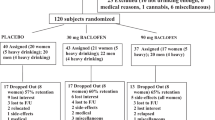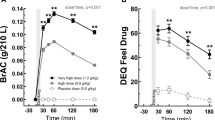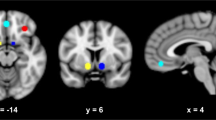Abstract
Previous studies suggest that GABA-B receptor agonism may represent an effective pharmacological approach to treat addictive disorders. Baclofen is a selective GABA-B receptor agonist which has been investigated as a potential treatment for alcohol use disorder. However, research is needed to understand the biobehavioral mechanisms underlying baclofen’s effect on alcohol use. In the present randomized, double-blind, placebo-controlled study, thirty-four alcohol-dependent individuals were randomized to receive baclofen (30 mg/d) or placebo for a week, and then participated in a laboratory experiment consisting of three procedures: alcohol cue-reactivity, priming, and self-administration. During the experiment, craving and other subjective responses to alcohol were assessed, and blood samples were collected for pharmacokinetic measurements. The effects of baclofen on the relationships between different alcohol-related laboratory parameters were investigated. Baclofen pharmacokinetic parameters and their correlations with behavioral measures were also examined. Results showed that baclofen disrupted the link between alcohol priming and self-administration, as indicated by significant interaction effects between drug condition (baclofen vs. placebo) and some of the priming variables (alcohol craving: F3,9 = 6.03, p = 0.01; alcohol sedation: F3,6 = 7.16, p = 0.01) on the total amount of alcohol self-administered. Considerable interindividual variability in baclofen pharmacokinetic parameters was observed. Maximum plasma concentrations of baclofen negatively correlated with cue-induced alcohol craving (r = −0.57, p = 0.03) and priming-induced ratings of ‘like more’ (r = −0.59, p = 0.02). In conclusion, baclofen may work by dissociating the link between an initial drink (priming) and subsequent alcohol consumption (self-administration). Considerable pharmacokinetic variability is an important factor to take into account when employing baclofen as a treatment for alcohol use disorder.
This is a preview of subscription content, access via your institution
Access options
Subscribe to this journal
Receive 12 print issues and online access
$259.00 per year
only $21.58 per issue
Buy this article
- Purchase on Springer Link
- Instant access to full article PDF
Prices may be subject to local taxes which are calculated during checkout



Similar content being viewed by others
References
Bettler B, Tiao JY. Molecular diversity, trafficking and subcellular localization of GABAB receptors. Pharmacol Ther. 2006;110:533–43.
Agabio R, Sinclair JM, Addolorato G, Aubin HJ, Beraha EM, Caputo F et al. Baclofen for the treatment of alcohol use disorder: the Cagliari statement. Lancet Psychiatry. [In Press].
Daoust M, Saligaut C, Lhuintre JP, Moore N, Flipo JL, Boismare F. GABA transmission, but not benzodiazepine receptor stimulation, modulates ethanol intake by rats. Alcohol. 1987;4:469–72.
Colombo G, Vacca G, Serra S, Brunetti G, Carai MA, Gessa GL. Baclofen suppresses motivation to consume alcohol in rats. Psychopharmacol (Berl). 2003;167:221–4.
Colombo G, Addolorato G, Agabio R, Carai MA, Pibiri F, Serra S, et al. Role of GABA(B) receptor in alcohol dependence: reducing effect of baclofen on alcohol intake and alcohol motivational properties in rats and amelioration of alcohol withdrawal syndrome and alcohol craving in human alcoholics. Neurotox Res. 2004;6:403–14.
Williams KL, Nickel MM, Bielak JT. Baclofen blocks yohimbine-induced increases in ethanol-reinforced responding in rats. Pharmacol Biochem Behav. 2016;144:20–25.
Maccioni P, Bienkowski P, Carai MA, Gessa GL, Colombo G. Baclofen attenuates cue-induced reinstatement of alcohol-seeking behavior in Sardinian alcohol-preferring (sP) rats. Drug Alcohol Depend. 2008;95:284–7.
Bianchi PC, Carneiro de Oliveira PE, Palombo P, Leao RM, Cogo-Moreira H, Planeta CDS, et al. Functional inactivation of the orbitofrontal cortex disrupts context-induced reinstatement of alcohol seeking in rats. Drug Alcohol Depend. 2018;186:102–12.
Colombo G, Serra S, Brunetti G, Atzori G, Pani M, Vacca G, et al. The GABA(B) receptor agonists baclofen and CGP 44532 prevent acquisition of alcohol drinking behaviour in alcohol-preferring rats. Alcohol Alcohol. 2002;37:499–503.
Maccioni P, Lorrai I, Contini A, Leite-Morris K, Colombo G. Microinjection of baclofen and CGP7930 into the ventral tegmental area suppresses alcohol self-administration in alcohol-preferring rats. Neuropharmacology. 2018;136(Pt A):146–58.
Quintanilla ME, Perez E, Tampier L. Baclofen reduces ethanol intake in high-alcohol-drinking University of Chile bibulous rats. Addict Biol. 2008;13:326–36.
Smith BR, Boyle AE, Amit Z. The effects of the GABA(B) agonist baclofen on the temporal and structural characteristics of ethanol intake. Alcohol. 1999;17:231–40.
Smith BR, Robidoux J, Amit Z. GABAergic involvement in the acquisition of voluntary ethanol intake in laboratory rats. Alcohol Alcohol. 1992;27:227–31.
Janak PH, Michael Gill T. Comparison of the effects of allopregnanolone with direct GABAergic agonists on ethanol self-administration with and without concurrently available sucrose. Alcohol. 2003;30:1–7.
Anstrom KK, Cromwell HC, Markowski T, Woodward DJ. Effect of baclofen on alcohol and sucrose self-administration in rats. Alcohol Clin Exp Res. 2003;27:900–8.
Stromberg MF. The effect of baclofen alone and in combination with naltrexone on ethanol consumption in the rat. Pharmacol Biochem Behav. 2004;78:743–50.
Walker BM, Koob GF. The gamma-aminobutyric acid-B receptor agonist baclofen attenuates responding for ethanol in ethanol-dependent rats. Alcohol Clin Exp Res. 2007;31:11–18.
Lorrai I, Maccioni P, Gessa GL, Colombo G. R (+)-Baclofen, but Not S(-)-Baclofen, Alters Alcohol Self-Administration in Alcohol-Preferring Rats. Front Psychiatry. 2016;7:68.
Czachowski CL, Legg BH, Stansfield KH. Ethanol and sucrose seeking and consumption following repeated administration of the GABA(B) agonist baclofen in rats. Alcohol Clin Exp Res. 2006;30:812–8.
Agabio R, Leite-Morris KA, Addolorato G, Colombo G Targeting the GABAB Receptor for the Treatment of Alcohol Use Disorder. In: Colombo G (ed). GABAB Receptor. Springer International Publishing: Cham, 2016, pp 287-307.
Addolorato G, Caputo F, Capristo E, Domenicali M, Bernardi M, Janiri L, et al. Baclofen efficacy in reducing alcohol craving and intake: a preliminary double-blind randomized controlled study. Alcohol Alcohol. 2002;37:504–8.
Addolorato G, Leggio L, Ferrulli A, Cardone S, Vonghia L, Mirijello A, et al. Effectiveness and safety of baclofen for maintenance of alcohol abstinence in alcohol-dependent patients with liver cirrhosis: randomised, double-blind controlled study. Lancet. 2007;370:1915–22.
Addolorato G, Leggio L, Ferrulli A, Cardone S, Bedogni G, Caputo F, et al. Dose-response effect of baclofen in reducing daily alcohol intake in alcohol dependence: secondary analysis of a randomized, double-blind, placebo-controlled trial. Alcohol Alcohol. 2011;46:312–7.
Morley KC, Baillie A, Fraser I, Furneaux-Bate A, Dore G, Roberts M et al. Baclofen in the treatment of alcohol dependence with or without liver disease: multisite, randomised, double-blind, placebo-controlled trial. Br J Psychiatry 2018;212:362–9.
Leggio L, Zywiak WH, Edwards SM, Tidey JW, Swift RM, Kenna GA. A preliminary double-blind, placebo-controlled randomized study of baclofen effects in alcoholic smokers. Psychopharmacol (Berl). 2015;232:233–43.
Garbutt JC, Kampov-Polevoy AB, Gallop R, Kalka-Juhl L, Flannery BA. Efficacy and safety of baclofen for alcohol dependence: a randomized, double-blind, placebo-controlled trial. Alcohol Clin Exp Res. 2010;34:1849–57.
Hauser P, Fuller B, Ho SB, Thuras P, Kern S, Dieperink E. The safety and efficacy of baclofen to reduce alcohol use in veterans with chronic hepatitis C: a randomized controlled trial. Addiction. 2017;112:1173–83.
Morley KC, Baillie A, Leung S, Addolorato G, Leggio L, Haber PS. Baclofen for the treatment of alcohol dependence and possible role of comorbid anxiety. Alcohol Alcohol. 2014;49:654–60.
Ponizovsky AM, Rosca P, Aronovich E, Weizman A, Grinshpoon A. Baclofen as add-on to standard psychosocial treatment for alcohol dependence: a randomized, double-blind, placebo-controlled trial with 1 year follow-up. J Subst Abus Treat. 2015;52:24–30.
Muller CA, Geisel O, Pelz P, Higl V, Kruger J, Stickel A, et al. High-dose baclofen for the treatment of alcohol dependence (BACLAD study): a randomized, placebo-controlled trial. Eur Neuropsychopharmacol. 2015;25:1167–77.
Beraha EM, Salemink E, Goudriaan AE, Bakker A, de Jong D, Smits N, et al. Efficacy and safety of high-dose baclofen for the treatment of alcohol dependence: A multicentre, randomised, double-blind controlled trial. Eur Neuropsychopharmacol. 2016;26:1950–9.
Reynaud M, Aubin HJ, Trinquet F, Zakine B, Dano C, Dematteis M, et al. A Randomized, Placebo-Controlled Study of High-Dose Baclofen in Alcohol-Dependent Patients-The ALPADIR Study. Alcohol Alcohol. 2017;52:439–46.
Bschor T, Henssler J, Muller M, Baethge C. Baclofen for alcohol use disorder-a systematic meta-analysis. Acta Psychiatr Scand. 2018;138:232–42.
Pierce M, Sutterland A, Beraha EM, Morley K, van den Brink W. Efficacy, tolerability, and safety of low-dose and high-dose baclofen in the treatment of alcohol dependence: A systematic review and meta-analysis. Eur Neuropsychopharmacol. 2018;28:795–806.
Rose AK, Jones A. Baclofen: its effectiveness in reducing harmful drinking, craving, and negative mood. A meta-analysis. Addiction. 2018;113:1396–406.
Yardley MM, Ray LA. Medications development for the treatment of alcohol use disorder: insights into the predictive value of animal and human laboratory models. Addict Biol. 2017;22:581–615.
Leggio L, Zywiak WH, McGeary JE, Edwards S, Fricchione SR, Shoaff JR, et al. A human laboratory pilot study with baclofen in alcoholic individuals. Pharmacol Biochem Behav. 2013;103:784–91.
Evans SM, Bisaga A. Acute interaction of baclofen in combination with alcohol in heavy social drinkers. Alcohol Clin Exp Res. 2009;33:19–30.
Farokhnia M, Schwandt ML, Lee MR, Bollinger JW, Farinelli LA, Amodio JP, et al. Biobehavioral effects of baclofen in anxious alcohol-dependent individuals: a randomized, double-blind, placebo-controlled, laboratory study. Transl Psychiatry. 2017;7:e1108.
Marsot A, Imbert B, Alvarez JC, Grassin-Delyle S, Jaquet I, Lancon C, et al. High variability in the exposure of baclofen in alcohol-dependent patients. Alcohol Clin Exp Res. 2014;38:316–21.
Chevillard L, Sabo N, Tod M, Labat L, Chasport C, Chevaleyre C, et al. Population pharmacokinetics of oral baclofen at steady-state in alcoholic-dependent adult patients. Fundam Clin Pharmacol. 2018;32:239–48.
Farokhnia M, Sheskier MB, Lee MR, Le AN, Singley E, Bouhlal S, et al. Neuroendocrine response to GABA-B receptor agonism in alcohol-dependent individuals: Results from a combined outpatient and human laboratory experiment. Neuropharmacology. 2018;137:230–9.
Guidance for Industry: Bioanalytical Method Validation US Department of Health and Human Services (HHS), Food and Drug Administration (FDA), Center for Drug Evaluation and Research (CDER), Center for Veterinary Medicine (CVM) 2013.
Bender R, Lange S. Adjusting for multiple testing--when and how? J Clin Epidemiol. 2001;54:343–9.
O’Malley SS, Krishnan-Sarin S, Farren C, Sinha R, Kreek MJ. Naltrexone decreases craving and alcohol self-administration in alcohol-dependent subjects and activates the hypothalamo-pituitary-adrenocortical axis. Psychopharmacol (Berl). 2002;160:19–29.
Le AD, Quan B, Juzytch W, Fletcher PJ, Joharchi N, Shaham Y. Reinstatement of alcohol-seeking by priming injections of alcohol and exposure to stress in rats. Psychopharmacol (Berl). 1998;135:169–74.
Hauser SR, Deehan GA Jr., Knight CP, Toalston JE, McBride WJ, et al. Parameters of context-induced ethanol (EtOH)-seeking in alcohol-preferring (P) rats: temporal analysis, effects of repeated deprivation, and EtOH priming injections. Alcohol Clin Exp Res. 2016;40:2229–39.
Shaham Y, Shalev U, Lu L, de Wit H, Stewart J. The reinstatement model of drug relapse: history, methodology and major findings. Psychopharmacol (Berl). 2003;168:3–20.
Spano MS, Fattore L, Fratta W, Fadda P. The GABAB receptor agonist baclofen prevents heroin-induced reinstatement of heroin-seeking behavior in rats. Neuropharmacology. 2007;52:1555–62.
Fattore L, Spano MS, Cossu G, Scherma M, Fratta W, Fadda P. Baclofen prevents drug-induced reinstatement of extinguished nicotine-seeking behaviour and nicotine place preference in rodents. Eur Neuropsychopharmacol. 2009;19:487–98.
Campbell UC, Lac ST, Carroll ME. Effects of baclofen on maintenance and reinstatement of intravenous cocaine self-administration in rats. Psychopharmacol (Berl). 1999;143:209–14.
Gabriele A, See RE. Lesions and reversible inactivation of the dorsolateral caudate-putamen impair cocaine-primed reinstatement to cocaine-seeking in rats. Brain Res. 2011;1417:27–35.
Rocha A, Kalivas PW. Role of the prefrontal cortex and nucleus accumbens in reinstating methamphetamine seeking. Eur J Neurosci. 2010;31:903–9.
de Wit H. Laboratory-based assessment of alcohol craving in social drinkers. Addiction. 2000;95(Suppl 2):S165–169.
Paulus MP, Stewart JL. Interoception and drug addiction. Neuropharmacology. 2014;76(Pt B):342–50.
Duka T, Townshend JM. The priming effect of alcohol pre-load on attentional bias to alcohol-related stimuli. Psychopharmacol (Berl). 2004;176:353–61.
Amlung M, McCarty KN, Morris DH, Tsai CL, McCarthy DM. Increased behavioral economic demand and craving for alcohol following a laboratory alcohol challenge. Addiction. 2015;110:1421–8.
Hicks JA, Schlegel RJ, Friedman RS, McCarthy DM. Alcohol primes, expectancies, and the working self-concept. Psychol Addict Behav. 2009;23:534–8.
Wardell JD, Le Foll B, Hendershot CS. Preliminary evaluation of a human laboratory model of impaired control over alcohol using intravenous alcohol self-administration. J Psychopharmacol. 2018;32:105–15.
Christiansen P, Townsend G, Knibb G, Field M. Bibi ergo sum: the effects of a placebo and contextual alcohol cues on motivation to drink alcohol. Psychopharmacol (Berl). 2017;234:827–35.
Bujarski S, Jentsch JD, Roche DJO, Ramchandani VA, Miotto K, Ray LA. Differences in the subjective and motivational properties of alcohol across alcohol use severity: application of a novel translational human laboratory paradigm. Neuropsychopharmacology. 2018;43:1891–9.
Sinha R. The clinical neurobiology of drug craving. Curr Opin Neurobiol. 2013;23:649–54.
Farokhnia M, Momenan R, Leggio L. (2017): Advancing medication development for addiction-behavioral and neuroimaging outcomes as indirect biomarkers of target engagement. Addiction. 2017;112:1869–70. Commentary on Schmitz et al.
Spanagel R, Zieglgansberger W. Anti-craving compounds for ethanol: new pharmacological tools to study addictive processes. Trends Pharmacol Sci. 1997;18:54–59.
Wardell JD, Ramchandani VA, Hendershot CS. A multilevel structural equation model of within- and between-person associations among subjective responses to alcohol, craving, and laboratory alcohol self-administration. J Abnorm Psychol. 2015;124:1050–63.
Morean ME, Corbin WR. Subjective response to alcohol: a critical review of the literature. Alcohol Clin Exp Res. 2010;34:385–95.
Schuckit MA. Low level of response to alcohol as a predictor of future alcoholism. Am J Psychiatry. 1994;151:184–9.
Ray LA, Bujarski S, Roche DJ. Subjective response to alcohol as a research domain criterion. Alcohol Clin Exp Res. 2016;40:6–17.
Ariwodola OJ, Weiner JL. Ethanol potentiation of GABAergic synaptic transmission may be self-limiting: role of presynaptic GABA(B) receptors. J Neurosci. 2004;24:10679–86.
Misgeld U, Bijak M, Jarolimek W. A physiological role for GABAB receptors and the effects of baclofen in the mammalian central nervous system. Prog Neurobiol. 1995;46:423–62.
Wan FJ, Berton F, Madamba SG, Francesconi W, Siggins GR. Low ethanol concentrations enhance GABAergic inhibitory postsynaptic potentials in hippocampal pyramidal neurons only after block of GABAB receptors. Proc Natl Acad Sci USA. 1996;93:5049–54.
Weiner JL, Valenzuela CF. Ethanol modulation of GABAergic transmission: the view from the slice. Pharmacol Ther. 2006;111:533–54.
Roberto M, Gilpin NW, O’Dell LE, Cruz MT, Morse AC, Siggins GR, et al. Cellular and behavioral interactions of gabapentin with alcohol dependence. J Neurosci. 2008;28:5762–71.
Peris J, Eppler B, Hu M, Walker DW, Hunter BE, Mason K, et al. Effects of chronic ethanol exposure on GABA receptors and GABAB receptor modulation of 3H-GABA release in the hippocampus. Alcohol Clin Exp Res. 1997;21:1047–52.
Vlachou S, Markou A. GABAB receptors in reward processes. Adv Pharmacol. 2010;58:315–71.
Maccioni P, Zaru A, Loi B, Lobina C, Carai MA, Gessa GL, et al. Comparison of the effect of the GABABeta receptor agonist, baclofen, and the positive allosteric modulator of the GABAB receptor, GS39783, on alcohol self-administration in 3 different lines of alcohol-preferring rats. Alcohol Clin Exp Res. 2012;36:1748–66.
Augier E, Dulman RS, Damadzic R, Pilling A, Hamilton JP, Heilig M. The GABAB positive allosteric modulator ADX71441 attenuates alcohol self-administration and relapse to alcohol seeking in rats. Neuropsychopharmacology. 2017;42:1789–99.
Abrahao KP, Salinas AG, Lovinger DM. Alcohol and the brain: neuronal molecular targets, synapses, and circuits. Neuron. 2017;96:1223–38.
Siggins GR, Roberto M, Nie Z. The tipsy terminal: presynaptic effects of ethanol. Pharmacol Ther. 2005;107:80–98.
Chick J, Nutt DJ. Substitution therapy for alcoholism: time for a reappraisal? J Psychopharmacol. 2012;26:205–12.
Leggio L, Garbutt JC, Addolorato G. Effectiveness and safety of baclofen in the treatment of alcohol dependent patients. CNS Neurol Disord Drug Targets. 2010;9:33–44.
Holtyn AF, Kaminski BJ, Weerts EM. Baclofen and naltrexone effects on alcohol self-administration: Comparison of treatment initiated during abstinence or ongoing alcohol access in baboons. Drug Alcohol Depend. 2017;179:47–54.
Mann K, Aubin HJ, Charlet K, Witkiewitz K. Can reduced drinking be a viable goal for alcohol dependent patients? World Psychiatry. 2017;16:325–6.
Rose AK, Duka T. Effects of dose and time on the ability of alcohol to prime social drinkers. Behav Pharmacol. 2006;17:61–70.
Acknowledgements
This work was supported by: (1) NIH intramural funding ZIA-AA000218 (Section on Clinical Psychoneuroendocrinology and Neuropsychopharmacology; PI: Dr. Lorenzo Leggio), jointly supported by the NIAAA Division of Intramural Clinical and Biological Research and the NIDA Intramural Research Program; and (2) Brain and Behavior Research Foundation (BBRF; formerly NARSAD) grant #17325 (PI: Dr. Lorenzo Leggio). We thank the clinical and research staff involved in data collection and support in the joint NIAAA/NIDA Section on Clinical Psychoneuroendocrinology and Neuropsychopharmacology, in the NIAAA clinical program of the Division of Intramural Clinical and Biological Research, at the NIH Clinical Center (Nursing, Nutrition, and Pharmacy Departments), and in the Clinical Pharmacokinetics Research Laboratory at the University of Rhode Island. The authors would like to express their gratitude to the participants who took part in this study.
Author information
Authors and Affiliations
Corresponding author
Ethics declarations
Conflict of interest
The authors declare that they have no conflict of interest.
Electronic supplementary material
Rights and permissions
About this article
Cite this article
Farokhnia, M., Deschaine, S.L., Sadighi, A. et al. A deeper insight into how GABA-B receptor agonism via baclofen may affect alcohol seeking and consumption: lessons learned from a human laboratory investigation. Mol Psychiatry 26, 545–555 (2021). https://doi.org/10.1038/s41380-018-0287-y
Received:
Revised:
Accepted:
Published:
Issue Date:
DOI: https://doi.org/10.1038/s41380-018-0287-y
This article is cited by
-
Trait sensitivity to positive feedback is a predisposing factor for several aspects of compulsive alcohol drinking in male rats: behavioural, physiological, and molecular correlates
Psychopharmacology (2024)
-
Novel Agents for the Pharmacological Treatment of Alcohol Use Disorder
Drugs (2022)
-
Helpful or Harmful? The Therapeutic Potential of Medications with Varying Degrees of Abuse Liability in the Treatment of Substance Use Disorders
Current Addiction Reports (2022)
-
Baclofen attenuates fMRI alcohol cue reactivity in treatment-seeking alcohol dependent individuals
Psychopharmacology (2021)



